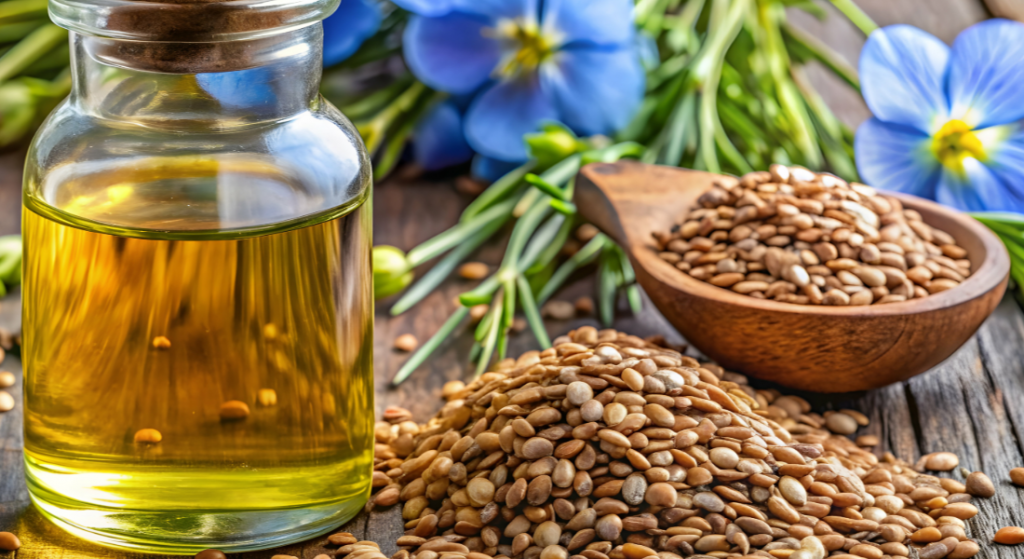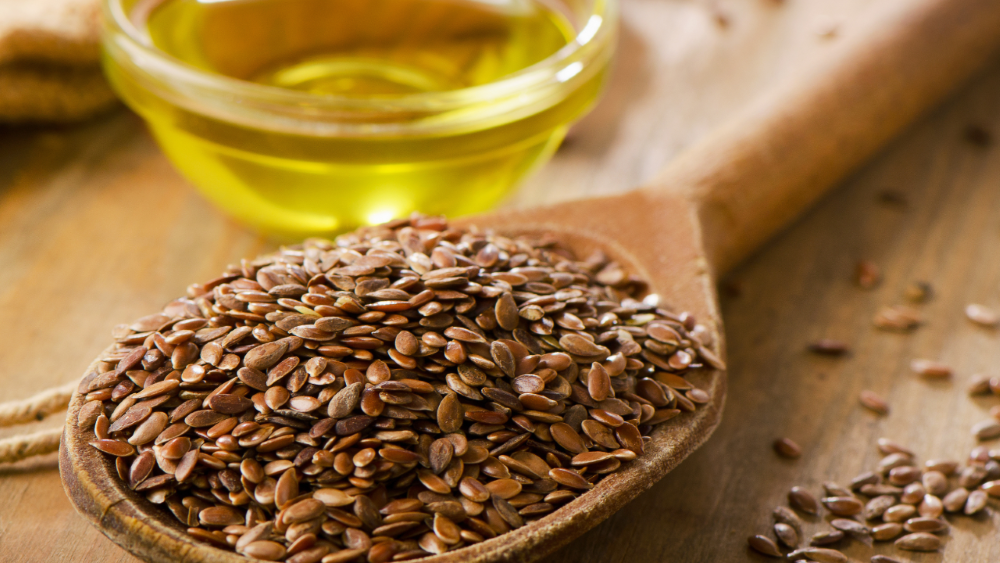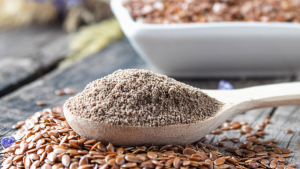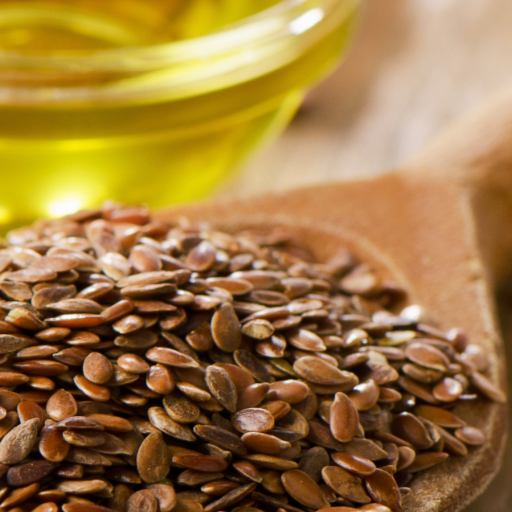Flaxseed In Your Diet
Flaxseed is one of the oldest cultivated superfoods to be used for its health-promoting benefits. Flaxseeds are packed full of nutrients, antioxidants, and plant compounds that have numerous benefits for the human body.

Flaxseed has been used in foods and medicine for at least 6000 years. Flax plants are one of the oldest known cultivated crops, grown at least as far back as ancient Egypt and China. The plants were used to make clothing and paper, while the seeds were consumed to promote health. The seeds have also been used in Ayurvedic medicine for a few thousand years and are thought to support overall health and immunity.
In fact, you’ll be surprised at just how much you can get out of them by consuming 1-2 tablespoons daily of flaxseed can massively boost your overall health.
Where Do Flaxseeds Come From
Flaxseeds come from a remarkable plant known as the flax or linseed plant (Linum usitatissimum). Flax seeds are primarily grown in cool, temperate regions of the world, including:
· Europe (France, Belgium, Netherlands)
· North America (Canada, United States)
· Asia (Kazakhstan, Russia, China)
The seeds are harvested from mature flax pods resembling small, brown or golden spheres. After harvesting, the seeds are cleaned and processed for consumption or oil production.
Top Health Benefits of Flaxseeds
Rich in Essential Health-Boosting Nutrients

Flaxseeds contain a variety of essential vitamins and minerals Just a one tablespoon serving of whole seeds will get you about 10% the daily value (DV) of magnesium, 13% DV of manganese, 11% DV thiamin (vitamin B1), and good amounts of phosphorus, copper, potassium, selenium, iron, and calcium. The high magnesium content is especially notable because magnesium is a mineral many people are deficient in, yet one that is vital for proper sleep, brain function, heart function, and much more.
Along with being rich in essential nutrients, flaxseeds are also one of the best plant-based sources of omega-3. Omega-3s are the fatty acids also found in fish oil, although they take a different form in flax. They are known to support mental health, heart health, skin health, support microbiome, and eye health, amongst other important health benefits
To top it all off, flaxseeds are also the #1 food source of a powerful plant compound group known as lignans, which have multiple health-boosting properties.
Boosts Heart Health with High ALA Content
Flaxseeds contain a specific type of omega-3 fatty acid known as alpha-linolenic acid (ALA). This is a different type of omega-3 than the heart-boosting eicosapentaenoic acid (EPA) found in fish oil.
EPA and DHA are considered the “active” forms of omega-3 and for a long time have been thought of as more valuable than ALA.
This is because the process by which your body converts ALA into EPA and DHA is very inefficient, meaning you would need to consume a lot of ALA to get enough of the other two forms.
Researchers are now showing that ALA has its own very significant health benefits in a similar way to EPA and DHA particularly for heart health. Recent studies have found that a higher consumption of ALA is linked to a lower risk for heart disease and a lower risk of heart attack. Multiple studies have also shown a connection between ALA and a reduced risk of stroke.
Specifically, the major health benefits of flaxseeds seem to be for lowering cholesterol levels and blood pressure, two huge risk factors for heart problems. Flaxseed has shown the ability to lower LDL which is the (bad) cholesterol and total cholesterol, while also raising HDL (good) cholesterol and reducing blood pressure, which is outstanding overall health benefits!
Supports Regularity & Gut Health
Most adults should be getting at least 25 grams of fiber per day, and often more. By adding flaxseeds to your diet can help you significantly make up the nutritional gap, since just one tablespoon contains about 3 grams of dietary fiber. The fiber in flaxseeds is a combination of soluble and insoluble, which works together to keep your bowel movements regular. The soluble fiber pulls in water as it goes through your digestive tract, helping to keep your stool soft. Insoluble fiber adds bulk to the stool and keeps things moving.
Certain types of soluble fiber like the kind found in flaxseeds also act as a prebiotic to feed the good bacteria in your gut. This has long lasting effects for digestive health and helps decrease the population of pathogenic (disease-causing) bacteria as well.
Fights Chronic Inflammation
Chronic inflammation is a huge epidemic in today’s world and a major contributor to many chronic diseases, particularly “age-related” ones. Consuming more plant foods, especially those rich in antioxidants, is one of the best ways to combat inflammation, and flaxseeds are a great example of this.
The health benefits of flaxseeds for lowering inflammation come from several sources: omega-3s, fiber, and antioxidant activity.
Omega-3s are well-known for their anti-inflammatory effects, this type of omega-3 found in flaxseeds has been confirmed to have these properties as well.
Studies have shown that ALA consumption decreases certain inflammatory markers and particularly reduces inflammation in the arteries. The lignans in
flaxseeds act as antioxidants to further combat inflammation at the cellular level, making these tiny seeds a great addition to an anti-inflammatory diet.
Understanding the benefits of fiber and how it is an inflammation fighter, although few people realize this fact. However, research has shown that consuming more fiber could be one of the best ways to reduce systemic (chronic) inflammation!

Excellent Source of Plant-Based Protein
Flaxseeds are one of the best sources of high-quality plant-based protein, which is good news for anyone wanting to follow a plant-based diet.
They aren’t a complete protein, meaning they don’t contain all nine essential amino acids, but they can be one of a variety of foods used to replace meat-based protein. Interesting enough some of the amazing benefits of flaxseed protein that you probably won’t find in meat, including immune-boosting and antifungal properties!
Along with these extra superpowers, the protein in flaxseeds can also help with appetite control and weight management. Especially when combined with fiber, protein can help you to feel full and satisfied after eating, which helps maintain a healthy weight more easily.
May Reduce Your Cancer Risk
As mentioned earlier, flaxseeds are the top food source of a type of compound known as lignans. These compounds are the main force behind one of the most significant health benefits of flaxseeds: cancer-fighting potential. Research has shown that lignans possess antioxidant and estrogen-like properties. Both of these give flaxseeds the potential to reduce cancer risk, especially when it comes to hormone-related cancers. A large study that involved over 6000 women found that flaxseed consumption was linked to a lower chance of breast cancer, reducing the risk by around 25%. Other studies indicate that this reduced risk for breast cancer associated with flaxseeds is even more pronounced in postmenopausal women.
Another studies found that higher intakes of dietary fiber and lignans (both found in flaxseeds) may contribute to a lower risk of endometrial and ovarian cancer.
Studies also show that including flaxseed in your daily diet has the potential of reducing the risk of prostate cancer.

May Help Regulate Blood Sugar Levels
High blood sugar is a problem for many people and one of the biggest contributors to type 2 diabetes and metabolic syndrome.
Once again, plant foods can be incredibly helpful for controlling blood sugar levels because they are full of fiber that slows the release of sugar into your bloodstream.
Flaxseeds contain a good amount of insoluble fiber the kind that has shown to reduce blood sugar levels. Flaxseed in your diet has a lot of potential for diabetes control or prevention.
Boosts Skin & Hair Health
Along with lowering inflammation and supporting heart health, the omega-3 fatty acids in flaxseeds also give them health benefits for your skin and hair.
Alpha-linolenic acid (ALA) is one of two essential fatty acids your body can’t produce. When you consume it, it can be converted into the active forms of omega-3 as well as an omega-6 fatty acid known as gamma-linolenic acid (GLA).
All of these fatty acids particularly GLA are essential for maintaining young and healthy-looking skin. They help to keep your protective skin barrier intact, inhibit inflammation, and promote skin cell regeneration and wound healing. Fatty acids also contribute to a healthy scalp, which is key to nourished and healthy-looking hair.

Flaxseed oil made from cold-pressed flaxseeds has its own benefits worth mentioning.
First, it comprises even more omega-3 fatty acids than the seeds, with ALA comprising about 50-60% of the oil. This means you can get a concentrated “dose” of inflammation-fighting and skin-boosting omega-3s by consuming the oil regularly.
Flaxseed oil is also a well-known remedy for constipation, even though it doesn’t contain any fiber. Instead of stimulating your digestion like the fiber in the seeds would, it acts as a sort of lubricant, helping waste to “slip through” your digestive tract.
While there are undoubtedly benefits to consuming flaxseed oil and it’s best to use raw instead of heated flaxseeds are the better option to consume regularly and in larger amounts so that you don’t overdo it on fat and so that you get the benefits of lignans and fiber.
Get the Most Health Benefits of Flaxseeds by Using Them This Way
One of the best parts about flaxseeds is that you can get a huge number of benefits just by using a small amount of the seeds daily. Generally, 1-2 tablespoons of ground flax seeds is the recommended amount to start with to really have them make a difference to your health.
Key Tips to Remember
First, try to choose organic ground flaxseed so that toxins from pesticides, chemical fertilizers, etc., don’t interfere with the seeds’ health benefits.
Also, you want to consume ground flaxseeds because the whole seeds will simply pass right through your intestines without doing you any good.
However, flaxseed is quick to go rancid and lose many of its health-boosting properties after being ground. This means that the best option is to buy whole organic flaxseeds keep them refrigerate them. They can then easily be sprinkled on food, added to smoothies, etc.
If you don’t mind putting a little more work into it, you can also try soaking and sprouting the seeds to improve mineral absorption.
And as a final note, be sure to drink plenty of water when you add flaxseeds to your diet to keep the fiber moving through your digestive system.
Conclusion on This Super Seed
While there are plenty of superfoods, “super seeds” are some of the most nutrient-packed and easiest foods to add to your diet. Don’t let their small size fool you— flaxseeds might just be one of the healthiest foods you can eat and have significant health benefits. To get even more health-boosting benefits, rotate flaxseeds with chia seeds and hemp seeds in your diet, as each one provides a unique antioxidant profile, and together, they give you a complete source of plant-based protein.
Radiant Integrative Health is committed to helping you maintain a healthy lifestyle. If you have questions or are looking for guidance on any aspect of your health. Contact us at 702-333-8458. The providers at Radiant Integrative Health are here to support you in all aspects of your health and wellness.
Let us help you take the first step towards a happier, healthier you. Our providers are dedicated to helping you feel your best and live your best life!




